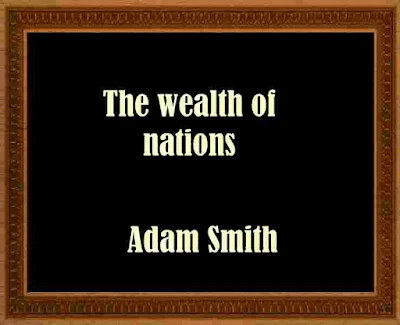Download The wealth of nations - Adam Smith - PDF ebook
The wealth of nations
 |
| The wealth of nations |
From introduction:
Adam Smith, the greatest of political economists, was born in 1723 at Kirkcaldy in Fifeshire, Scotland. He was sent in 1787 to the University of Glasgow, and three years later to Balliol College, Oxford, where he remained for seven years. In 1748 he gave lectures at Edinburgh on rhetoric and belles-lettres, and the intimate friendship that he here formed with David Hume must have powerfully influenced the formation of his opinions.
In 1751 he was elected Professor of Logic in Glasgow, and in the following year was transferred to the Chair of Moral Philosophy in the same University, a position which he occupied for nearly twelve years. In 1759 he brought out his "Theory of Moral Sentiments." Subsequently, he made a prolonged sojourn in France, where he lived in the society of Quesnay, Turgot, D'Alembert, and Helvetius. There is reason to believe that he began at Toulouse the "Inquiry into the Nature and Causes of the Wealth of Nations," a work upon which he was employed for many years.
This remarkable book appeared in 1776, and must still be regarded as the greatest exist- ing essay in the field of political economy, the only at- tempt to replace it, that of John Stuart Mill, having, on the whole, miscarried, notwithstanding its partial usefulness. Buckle pronounced it "the most important book ever written."
Political Economy is essentially a modern department of learning. It may be defined as the science which treats the production, distribution, and exchange of commodities. In the ancient world, we have only fitful adumbrations of the conception of such a science. In the Middle Ages proper, as might naturally be expected, no advance is made. Indeed, the idea itself is even lost. Production was almost exclusively for use, and trade or exchange was so little developed that the economic aspect of things never presented itself distinctively.
At the end of the fourteenth century, however, when the medieval order was gradually breaking up, and the germination of the modern industrial system was beginning to be apparent, a French bishop in the service of Charles. Y. of France, and a translator of Aristotle, revived the teaching of the great master of ancient speculation, but with no immediate results. Early in the sixteenth century, the famous astronomer and mathematician, Copernicus, wrote a treatise on the coining of money, again based on the principles of Aristotle; and toward the end of the century, modern economic science began to take shape in the great mercantile theory which held sway more or less almost until the days of Adam Smith. Before his time there were, however, isolated writers who attacked with more or less perspicuity the fallacies of this theory and had glimpses, in some cases not inconsiderable, of the more scientific doctrines developed in later times. The leading developments in political economy since Adam Smith's time have been
(1) the classical economy expounded by Ricardo, Malthus, J. B. Say, James Mill,' etc., which for a long time held almost undisputed possession of the field;
(2) as a later development, what is known as the "vulgar economy," consists of the at- tempts made by writers such as Wagner, Laveleye, Jevons, and Sidgwick, to modify the classical economy in such a way as to justify legislative interference with the unrestrained freedom of modern capitalist production; and
(3) the socialistic economy of Karl Marx and his school. Among the Greeks, where commerce (in the ancient sense of the word, implying the direct exchange of commodities) was considerably extended, are found the first germs of this as of all other sciences. Economic questions could hardly escape the notice of philosophers, least of all of those in the first rank. Accordingly, we find Plato and Aristotle alluding to the more important matters connected with the exchange of wealth in a manner that shows considerable insight into the question.
Its production, however, entered but slightly into their calculations. The institution of slavery, upon which ancient industry was based, could not fail to obscure the importance of this aspect of the subject. Plato, indeed, perceives that labour is the source of all wealth; but the conditions of his time prevented him from seeing in their true light the consequences of this doctrine. In the "Republic" ^ he says: ^ John Stuart Mill stands in many respects alone as an eclectic who tried to reconcile the unyielding "laws" of the classical economy with his benevolent nature. He is in a sense the precursor of the "vulgar" economy, but cannot be classed among its exponents.
Author: Adam Smith
Publication Date: 1902
Download The wealth of nations 22.8 MB - PDF ebook









